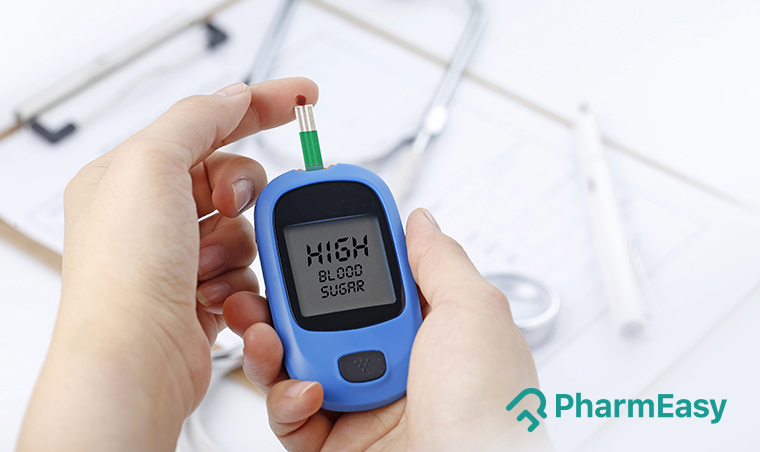Can A Non-Diabetic Also Report High Blood Sugar?
By Dr. Nikita Toshi +2 more

Get,

to manage your symptom
Get your,


4 Cr+ families
benefitted

OTP sent to 9988776655



You’ve successfully subscribed to receive
doctor-approved tips on
Whatsapp

Get ready to feel your best.

Hi There,
Download the PharmEasy App now!!


Register to Avail the Offer
Send OTPBy continuing, you agree with our Privacy Policy and Terms and Conditions

Hi There,
Sign up on PharmEasy now!!
Trusted by 4 crore+ families

OTP sent to 9988776655



You have unlocked 25% off on medicines




Code: NU25
By Dr. Nikita Toshi +2 more
Table of Contents
We all love a good sugar rush but are your sweet tooth cravings the boon or bane of your existence? Many people who have not been diagnosed with diabetes think that they can consume all the glucose they want without it hurting their health. That might not be entirely true. Why should you watch what you eat despite not having diabetes? Let’s find out!
We’ve all been told that those diagnosed with diabetes either Type 1 or 2 are vulnerable to a drastic alteration in the level of sugar in their blood. However, do you know that even non-diabetic people can be victims of this blood sugar fluctuation? Yes, you read it right! Your everyday routine plays a major role in contributing to the undulation of the sugar level in your blood and if not treated at an earlier stage can cause health problems beyond your imagination.

Medically known as hyperglycemia a.k.a, refers to an increased level of glucose detected in the blood. What you do daily can have an everlasting impact on your body without you even realising it. Burdening yourself with stress and other chronic ailments is just a recipe for disaster. Whether you’ve been diagnosed with diabetes or not, it is crucial to keep track of your sugar quantity. Infection, organ failure, low recovery rates and heart diseases are just some by-products of having incessant high sugar levels.
Check your blood sugar level 1-2 hours after eating and the amount of glucose in your blood during the post-eating and fasting phase gives you an accurate idea of the risk you possess. Fasting sugar above 100-125 mg/dL, postprandial sugars over 180 mg/dL or random blood sugar (taken any time during the day)- above 200 mg/dL, then your body has an unhealthy amount of blood sugar and that is hyperglycemia. It’s best to start monitoring your habits and developing healthy practices to avoid facing such consequences.
Some factors can lead to a transient rise in blood sugars in a person who is not diagnosed with diabetes. Even though multiple conditions could be aiding the development of high blood sugar in non-diabetic persons, the most commonly known ones are –
The above-listed causes are the well-known risk factors for diabetes type 2. Your doctor can diagnose and assess the reason and required treatment for high blood sugars for both persons with diabetes and without.
Chronic intake of steroids for various reasons like arthritis or autoimmune diseases also can cause reversible hyperglycemia, which improves after stopping steroids.
Dr. M.G. Kartheeka, MBBS, MD(Pediatrics)
These are some symptoms that both diabetic and non-diabetic patients with hyperglycemia face and you should be cautious of. If you’re observing any of these symptoms regularly then it is best to get yourself checked. Leaving it untreated can cause you more harm than you can imagine.
Unhealthy dietary habits, poorly managed lifestyle factors and a lack of physical activity are top contributors for a rise in blood sugar levels in non-diabetics, commonly called Nondiabetic hyperglycemia. Exercise caution to prevent the occurrence of a full-blown diabetes.
Dr. Ashish Bajaj, M.B.B.S., M.D. in Clinical Pharmacology and Toxicology
Here are some ways you can manage the amount of sugar in your blood to avoid health hazards to a greater extent –
Do not ignore even a transient rise in blood sugars due to any reason. PCOS, some medications and obesity can ultimately lead to diabetes. Your health is in your hands and maintaining it should be your number one priority. Like they say, ”Precaution is better than cure”. Be mindful of what you eat. Exercise regularly and live an active life to keep not just high blood sugar but many other diseases at bay.
Disclaimer: The information provided here is for educational/awareness purposes only and is not intended to be a substitute for medical treatment by a healthcare professional and should not be relied upon to diagnose or treat any medical condition. The reader should consult a registered medical practitioner to determine the appropriateness of the information before consuming any medication. PharmEasy does not provide any guarantee or warranty (express or implied) regarding the accuracy, adequacy, completeness, legality, reliability, or usefulness of the information; and disclaims any liability arising thereof.
Links and product recommendations in the information provided here are advertisements of third-party products available on the website. PharmEasy does not make any representation of the accuracy or suitability of such products/services. Advertisements do not influence the editorial decisions or content. The information in this blog is subject to change without notice. The authors and administrators reserve the right to modify, add, or remove content without notification. It is your responsibility to review this disclaimer regularly for any changes.

Leave your comment...
Comments